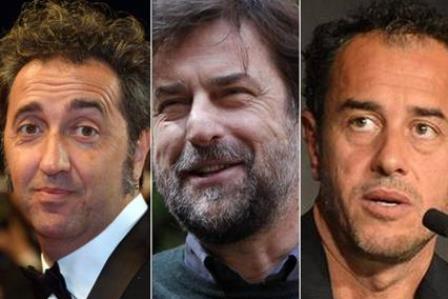
WTI Magazine #60 2015 May, 15
Author : Edoardo Peretti Translation by:
This year the 69th edition of the Cannes Film Festival has selected three Italians in the official competition: "Il racconto dei racconti" (Tale of tales) by Matteo Garrone, "Youth" by Paolo Sorrentino, "Mia madre" by Nanni Moretti. Garrone, Sorrentino and Moretti are regulars on the Croisette, but they also are the three most popular and internationally celebrated Italian directors in this moment.
According to us, the most interesting among the three is Matteo Garrone: his cinema, after the more realist debuts of "Terra di mezzo" (1996) and "Ospiti" (1998), has always played on a continuous tension between realism and surrealism, between naturalism and metaphysical, allowing him to accentuate the important issues, whether social or more intimate, which are the basis of his film; tension already evident in the uneven but interesting "Estate romana" (2000). It is therefore no surprise that the director has landed to the magic and fantasy in "Il racconto dei racconti" (Tale of tales), taken from one of the first European organic collection of fairy tales: "Lu cuntu de li cunti", written by Giambattista Basile in the seventeenth century. Garrone's cinema has always shown a shrewd expressionist use of environments and landscapes, immediate visual metaphors of the drift and the psychological obsessions of his characters. The representation of an obsession is the other cardinal point of his poetry. This is demonstrated by the two "soul horror", "L'imbalsamatore" and "Primo amore" and above all his best success, "Reality", where the apparent naturalism gains an almost unreal, dreamlike dimension, as the protagonist loses touch with himself and with the world around him. Even the celebrated "Gomorra" (Gomorrah), his much more "realistic" film, if analyzed in depth is not immune to a centrifugal, more metaphysical force, which makes the film much more complex and layered as it was told by many.
Paolo Sorrentino's cinema, on the other hand, has always been more visionary and grandiloquent. A cinema that reaches the stomach, primarily aiming to enchant and enthrall. However, it is not fair to define Sorrentino's cinema as simply and solely elegance. On the contrary, he is among the best European directors when creating a speech through the use of the camera. At the center of his films, often, there is a man struggling with the context, and almost always victim of it. Films like "L'uomo in più" (One man up) o "Le Conseguenze dell'amore" tell about loneliness and a lack of harmony with the surrounding environments, and their consequences. Sometimes the cause is the inability to empathize with the surrounding world, like in "L'uomo in più" (One man up) or in "L'amico di famiglia" (The Family Friend); other times it's the quiet life challenged by extraordinary events or feelings, like in "Le conseguenze dell'amore" (The Consequences of Love), "This must be the place" and in part in "La grande bellezza" (The great beauty); and sometimes is being "in too deep" in this world, like in "Il Divo", leading movie of a genre that could be called "politics of intimacy". In Sorrentino's cinema, then, the stylistic rhetoric enhances the analysis of the inner life: a strong humanistic cinema just disguised as virtuoso immediacy, as evidenced by many of the most touching and exciting sequences of the Oscar-winning "La grande bellezza" (The great beauty), another movie victim of analysis a bit superficial and trivial too much immediately related to political and social issues that are in the movie, but do not entirely define it.
Finally we come to Nanni Moretti: a lot has been written and said about him, often based on opposites, but equally partial and Manichean political prejudices. His cinema has been for a long period avowedly based on personal and autobiographical elements, irreverent, imaginative and anarchist in both formal and narrative. Still, in films such as "Bianca", "Caro Diario"(Dear Diary), "La messa è finita" or his debut "Io sono un autarchico" the autobiography, the obsessions and the tics of the director does not appear an end in itself, but they become the mirror, sometimes formidable, either of a strong discomfort and maladjustment (in the broadest sense of the term) of the individual, and segments of the society to which the individual is part.
The delicate balance between autobiography and more important issues is what made Moretti one of the most important European authors between '80s and '90s, though missed by many of his Italian followers and students, far too biased toward the autobiographical side. Lately, Moretti's cinema has definitely normalized, trying to introduce elements of his personal life film in more traditional and conformist frames, both for the narrative and for the style. But only the reserved and exciting drama "La stanza del figlio" (The son's room) is truly convincing, while the later films like "Mia madre", "Il caimano" and "Habemus Papam" (We have a pope) are unsolved films, sometimes even a bit weak, that seem to suffer from Moretti's attempts to place his film in more obvious frames while preserving the fundamental characteristics of his poetry.






